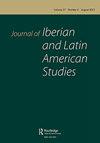19世纪中期阿根廷的考迪洛斯、民主和宪政
IF 0.3
0 HUMANITIES, MULTIDISCIPLINARY
Journal of Iberian and Latin American Studies
Pub Date : 2020-05-03
DOI:10.1080/14701847.2020.1789378
引用次数: 0
摘要
自独立初期以来,通过1819年和1826年失败的制宪计划,以及1853年的制宪会议,河床省见证了关于民主地位及其不同含义的各种法律和政治辩论:作为一种社会力量的表达,宣布了一种新的社会组织形式的曙光;作为代议制政府的理想,它伴随着政府形式从君主政体向共和政体的转变;以及一些可能的选举制度和代表问题的技术解决方案。另一方面,立宪主义不仅承诺了一种构建新政府的方式,而且还承诺了将个人权利理念作为新自由主义政权的意识形态基础的采用,以及一项超越地方政府无机统治的计划。本文通过对政治和宪法辩论以及该时期许多演员的著作的分析,探讨了19世纪阿根廷宪政形成的不同语言,同时考虑到独立、内战、民族统一和国家建设等冲突背景下描绘自由宪政特定概念的方式。本文章由计算机程序翻译,如有差异,请以英文原文为准。
Caudillos, democracy, and constitutionalism in mid nineteenth-century Argentina
ABSTRACT Since the early years of Independence, through the failed constitutional projects of 1819 and 1826, and culminating in the 1853 Constitutional Convention of 1853, the River Plate provinces witnessed a varied number of juridical and political debates on the status of democracy and its different meanings: as an expression of social forces announcing the dawn of a new form of social organization; as an ideal of representative government that was to accompany the transition from monarchical to republican forms of government; and as a number of possible electoral regimes and technical solutions to the problem of representation. On the other hand, constitutionalism promised not only a way of structuring the new governments but also the adoption of the idea of individual rights as an ideological foundation for the new liberal regimes, and a project to transcend the inorganic rule of provincial caudillos. This paper explores the different languages in which nineteenth-century Argentine constitutionalism was shaped, through an analysis of political and constitutional debates and the writings of many of the actors of the period, taking into account the ways in which the conflictive context of independence, civil wars, national unification, and state building delineated a particular conception of liberal constitutionalism.
求助全文
通过发布文献求助,成功后即可免费获取论文全文。
去求助
来源期刊

Journal of Iberian and Latin American Studies
HUMANITIES, MULTIDISCIPLINARY-
CiteScore
0.40
自引率
33.30%
发文量
23
 求助内容:
求助内容: 应助结果提醒方式:
应助结果提醒方式:


